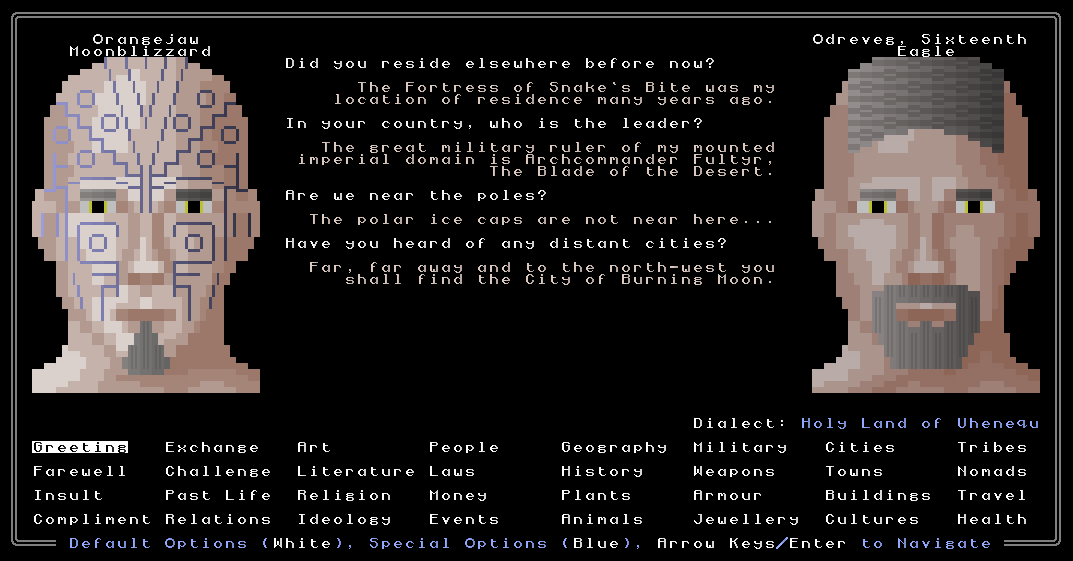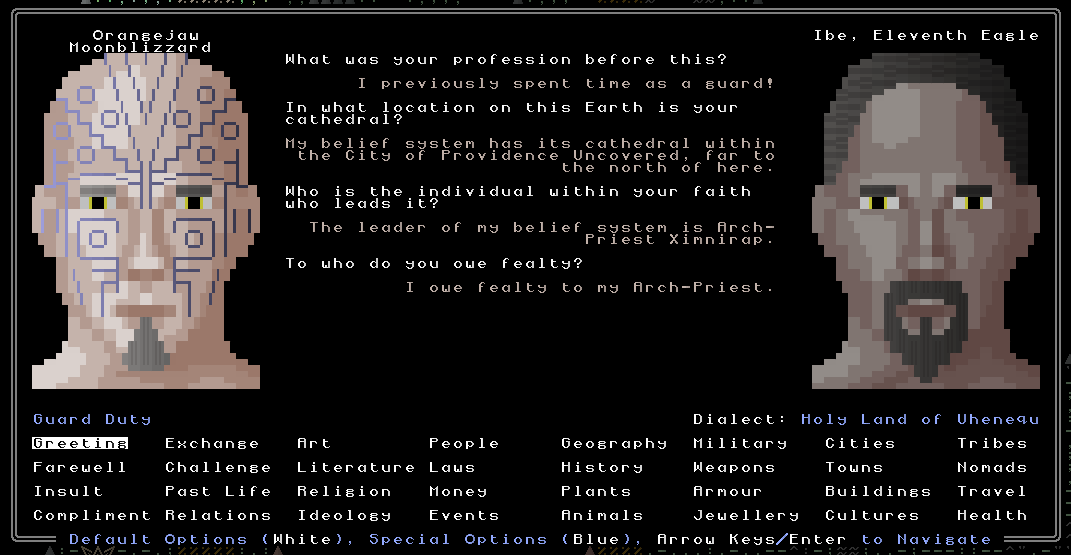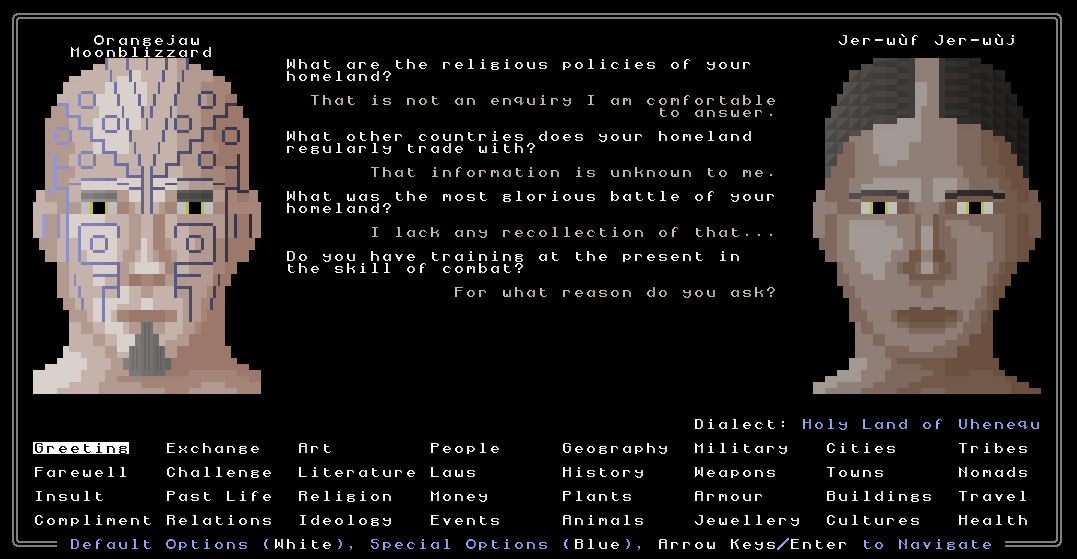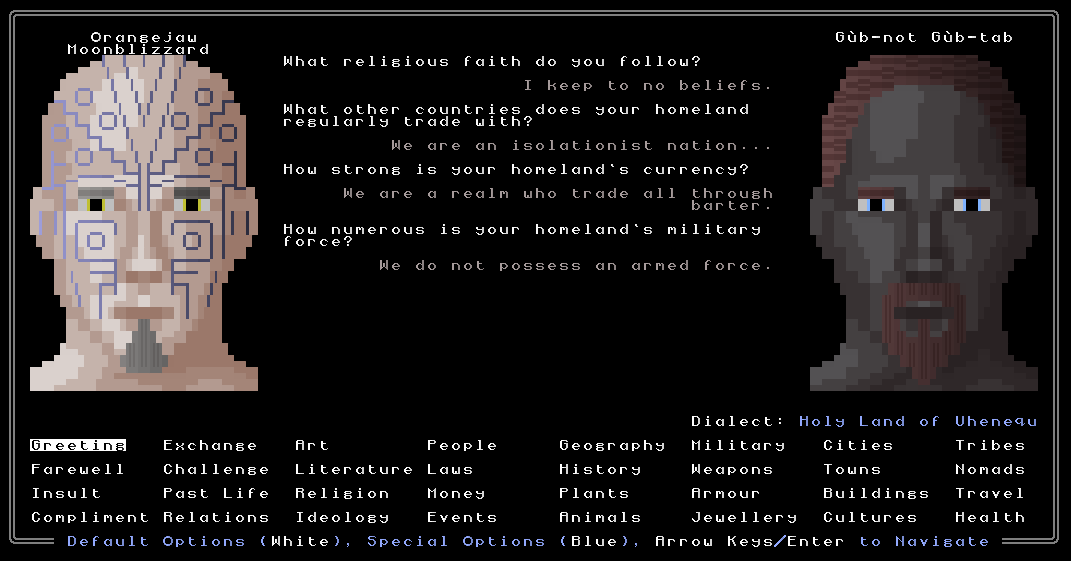All the remaining default conversation options, and all the remaining expansions, are now complete. I’ve also altered the expansion code such that certain expansions aren’t tied to certain words or sentences within a language and guaranteed to appear whenever that sentence or word is said, but instead they appear with a % chance for every instance of a particularly word or phrase someone in that dialect says, depending on their sentence complexity (as we discussed before, sentence complexity is now tied to individuals, not to entire cultures). Here’s a couple of examples, courtesy of our good playtesting friend, Orangejaw Moonblizzard, and some NPCs who may or may not have had their origins changed using admin commands for the sake of testing (as you’ll notice these replies could not be for the same nation!)…
Negative Replies
The big thing this week and weekend has been working on negative replies – so, for instance, if you ask “Are we near the desert?”, the default response is “We are near [desert] in [direction]”, or whatever, but obviously a valid option is “We are not near the desert” – and this obviously applies to loads of questions. What if the speaker’s nation has no army, or dislikes art, or have never travelled, or doesn’t know any other civilizations, or lives on a tiny island and knows nothing of the wider world, or doesn’t worship a religion, and so on? We therefore now have a body of negative replies for people to basically say “no”, “that’s irrelevant”, “I don’t know”, or “I don’t care”, in hundreds of thousands of interesting ways!
These negative replies effectively now split up into two categories, which we could usefully call “general” and “specific” negative replies. “General” negative replies include replies like “I don’t know”, “I don’t remember”, “I’d rather not answer”, “I’m not authorized to give you that information”, etc, which can apply to a huge range of NPCs in a huge range of situations. Since the player will run into these fairly often, I’ve made sure that there’s a lot of variation in these general negative responses – although in many cases, of course, there’s only so many ways that you can actually utter some of these things, but here are a few examples.
“Specific” negative replies refer to asking a question where the answer is still answering the question, rather than a general answer, but still a negative. For instance, if you ask someone what they think a particular policy in their nation should be, they might reply “I have no interest in politics”, or if you ask someone whether they know any distant cities you might want to visit, they might say “I know of no distant cities” – and so on and so forth. Each of these is often more specific and more varied than the above, so I’m trying to bias people towards using these wherever possible, although they are naturally dependent upon particular cultural/political/religious situations.
Crowd Disinterest
You’ll all recall the “conversation interest” idea that URR conversations will have implemented – that unless you ask relevant questions, NPCs will quickly lose interest in talking to you. This is to stop the player just going through every single question one after the other, and to encourage you towards asking sensible, logical and appropriate questions. However, I realized the other day that I can’t just limit this to a specific NPC getting bored; if you have a bunch of general questions you’re asking every soldier, for instance, then you could just go from one soldier over to the next soldier in the barracks and start questioning them, ignoring the questions you already asked Soldier 1, but assuming (quite fairly) that they will probably respond the same way, seeing as both Soldier 1 and Soldier 2 are just default soldiers.
Therefore, I need to implement some kind of “crowd disinterest” solution, and I think I’m going to do this on two levels. On the “local level”, NPCs within a building will see who you’re talking to and what you’re asking them about, and also within a map grid (within your line of sight, or nearby), and will take note of the questions. So if you question Soldier 1 about pointless stuff, and they tell you to go away, then you start asking Soldier 2 pointless stuff, the time it’ll take Soldier 2 to lose interest will be shorter than normal; Soldier 3’s will then be even shorter; and so forth. Then, at the global level, I think we need a system whereby information about the player slowly spreads through cultures/cities/religions/etc in the entire world so that people get some idea of whether they should respond to the player or not. Neither of these systems will be in 0.8, but they definitely need to be there.
Next Week
Remember those two new conversation features I mentioned a while back – replies and counter-questions – and also all those questions that have more complex replies, such as lists? Some combination of those will be coming next week – probably the complex replies, I would think. See you then!




